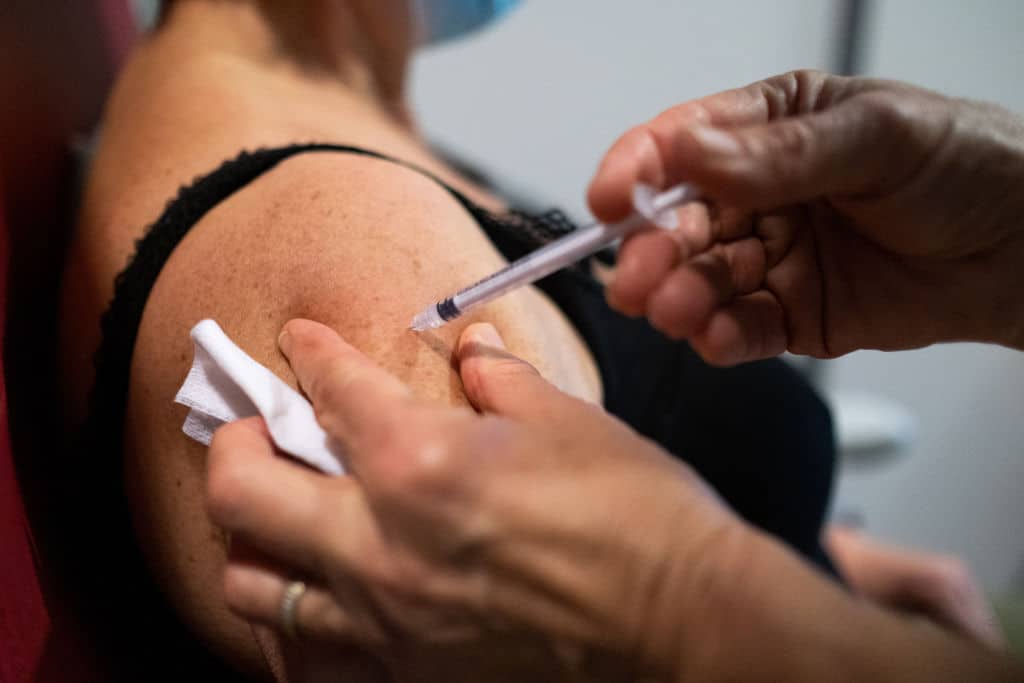TOPLINE
The Food and Drug Administration gave its approval for emergency use Monday to new updated Covid-19 vaccines from Pfizer-BioNTech and Moderna that are specially designed to protect against the latest dominant strain of the coronavirus, Omicron variant XBB.1.5—the latest effort of drugmakers, regulators and doctors to keep up with the virus’ ever evolving nature.
KEY FACTS
Anyone 5 or older is eligible to receive a single booster dose of the newly updated vaccines regardless of how many shots they’ve received before, as long as it’s at least 2 months since the last dose they received of any Covid-19 vaccine, the FDA announced.
Children between the ages of six months and four years are eligible to receive one or two doses of the new vaccines if they’ve been vaccinated against Covid-19 before, but if they’ve never received a vaccine, they’re eligible to receive three doses of the new Pfizer-BioNTech shot or two doses of Moderna, the FDA said.
This comes after the new XBB lineage of coronavirus, a group of new variants that emerged in late 2022, became the most common strain.
After the emergence of this new lineage, the FDA encouraged Pfizer-BioNTech, Moderna and Novavax to create new vaccines specialized to defend against it.
Loading...
These will be the first Covid-19 vaccines that aren’t free and paid for by the U.S. government, with Pfizer and Moderna both estimating their shots will cost between $110 and $130 per dose, though many health insurances plans will cover it and the CDC’s Bridge Program will pay for some uninsured Americans’ vaccines.
KEY BACKGROUND
Drugmakers have released a number of new iterations after the first Covid-19 vaccines were administered in late 2020. In fall 2021, the first booster shots were authorized by the FDA and were meant to help replenish waning immunity to the virus months after people received their initial doses. Then, after a new variant of the virus called Omicron, which was more resistant to the original vaccines, sparked a vicious new wave of the pandemic, drugmakers released a modified “bivalent” booster shot in fall 2022. That vaccine was designed to protect against both the original virus as well as Omicron. This new booster will attempt to do what that bivalent booster did with Omicron, but with the new XBB strains.
Forbes Daily: Get our best stories, exclusive reporting and essential analysis of the day’s news in your inbox every weekday.Sign Up
By signing up, you accept and agree to our Terms of Service (including the class action waiver and arbitration provisions), and Privacy Statement.
WHAT TO WATCH FOR
Now that the FDA has approved the drugs, the Centers for Disease Control and Prevention is scheduled to meet on Tuesday to decide whether it will recommend people receive the new booster shots, an additional standard regulatory step that each of the previous iterations of the vaccines have had to complete. People won’t be able to receive the new vaccines until the CDC gives its signoff.
SURPRISING FACT
While Pfizer-BioNTech and Moderna’s new vaccines were approved on Monday, the FDA still hasn’t approved Novavax’s. The company, which was a late entry into the Covid-19 vaccine market, had its first vaccines approved in July 2022. Its vaccines, unlike Pfizer-BioNTech and Moderna’s do not use mRNA technology, but rather are subunit vaccines that use a piece of the virus to invigorate a body’s immune response. The company said in an email Monday its vaccines have already arrived in the U.S. and, despite not being approved alongside Pfizer-BioNTech and Moderna’s, are still awaiting FDA approval. The company reiterated that its vaccines will be widely available across the country, but “timing is ultimately at the discretion of the FDA.” By 2:45 p.m. Eastern Time, Novavax’s stock price had fallen 10% to around $8 a share. Neither Pfizer nor Moderna’s stock moved significantly. Both fell less than 1.5%.
NEWS PEG
This comes as Covid-19 hospitalizations begin to rise across the U.S. In the week ending August 27, the most recent data available, hospital admissions for Covid-19 were up 15.7%, according to the CDC. That’s 17,418 hospital admissions during that week, and while that is still a far cry from the peak in January 2022, when there were around 150,000 hospitalizations a week, doctors believe it signals that a new wave could be coming in the fall.
TANGENT
These new vaccines follow doctors’ long held predictions that Covid-19 vaccines will likely become similar to the influenza vaccine, where a new iteration is released annually to keep up with new strains of the virus. At a September 2022 White House briefing, Anthony Fauci, former director of the National Institute of Allergy and Infectious Diseases and the leader of the federal government’s response to the pandemic, said: “We likely are moving towards a path with a vaccination cadence similar to that of the annual influenza vaccine, with annual updated Covid-19 shots matched to the currently circulating strains for most of the population.”
Loading...
